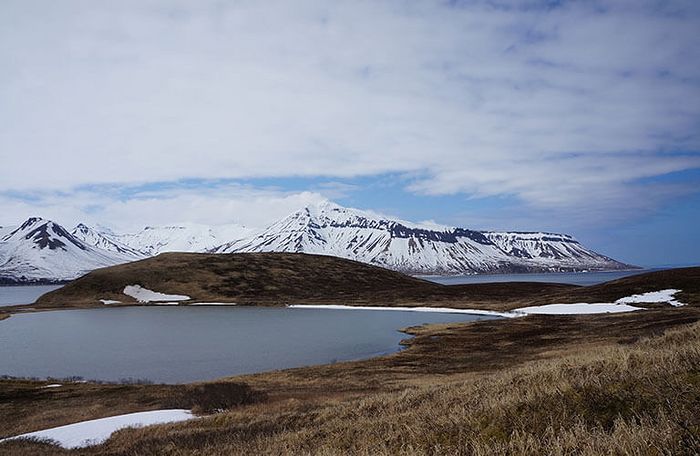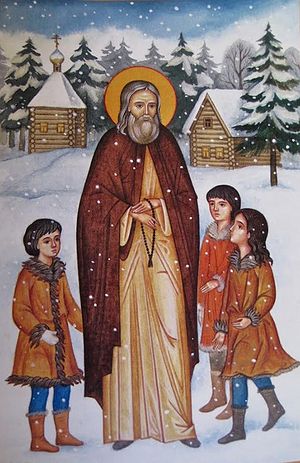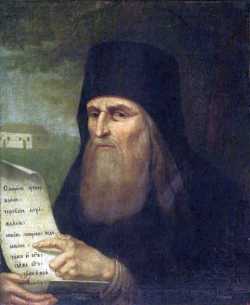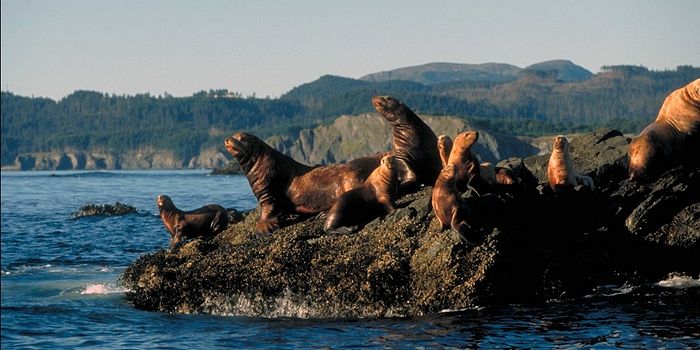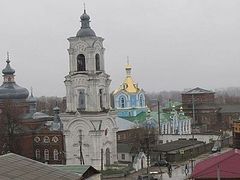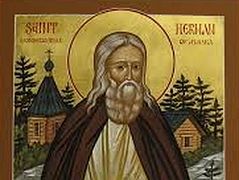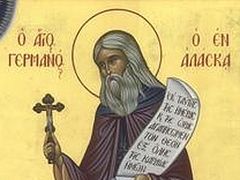St. Herman even in Alaska considered himself to be under obedience to his spiritual guide and abbot, Fr. Nazarius of Valaam Monastery. Whenever he had the time he would write to Valaam with reports on the missionary team’s work in the Alaskan territories among the native peoples. As we can see from St. Herman’s legacy of “Russian Orthodox Alaska” today, this missionary work was effective and enduring.
These letters were published in Russian in 1903.1 They were translated into English by the St. Herman of Alaska Brotherhood, Platina, California, and published in the Little Russian Philokalia, Vol. III: St. Herman (1988).
May 19, 1795
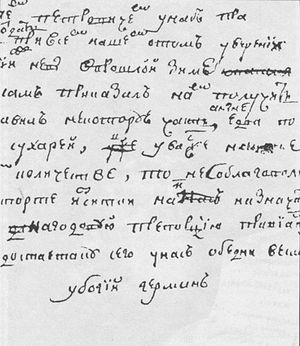 Fr. Herman’s own handwriting and signature. From the collection of Michael Z. Vinokouroff, Alaska State Library, Juneau, Alaska.
Fr. Herman’s own handwriting and signature. From the collection of Michael Z. Vinokouroff, Alaska State Library, Juneau, Alaska. By the grace of the Most High God and thanks to your holy prayers, we have safely reached the American territories, all ten men. The briefness of time does not allow me to describe such a great voyage in detail. Nearly the whole year was spent travelling. We did not meet with any adventures worth recording, although some impressed themselves by reason of the novelty of the place and the varied forms of travel. For the sake of conversation, you can tell those who are curious for news that while travelling on horseback along the Okhotsk road, we were attacked by bears. And on the ocean we saw several kinds of sea animals: whales, dolphin, sea otter, elephant seals and others of which we spotted quite a number. There have been no big storms except one.
We are located on the island of Kodiak, but this is not to be permanent. Our intention is to go to the mainland, although we are not sure just what place will be to our liking. The Americans2 are very eager for baptism—nearly seven thousand have been baptized. On Unalaska, while passing through the Aleutian chain, we were driven by an opposing wind to a place where the Aleuts amazed us with their zeal and readiness to be baptized.
Together with this letter, Fr. Makary is setting off for the Aleutian, Fox and Adrianovsk Islands in order to preach and to baptize. Fr. Juvenal will be leaving shortly for the mainland starting on the Kenai peninsula and then heading to the Chugachi, the Alegmint and further to the Kolosh and ocher tribes, even to the Chilliket.
Oh! Here enraptured in spirit, in spite of all the shortness of time I will snatch a short minute to relate some narratives [of the missionaries’ travels and apostolic fervor].
Finding myself between fair weather and foul, between joy and tedium, between sufficiency and insufficiency, satiety and hunger, warmth and coldness, in all my sorrows I find something that cheers me, when I hear conversations between the brethren about their preaching, and about their dividing up for this various regions among themselves—especially the discussion between Hieromonks Makary and Juvenal, for they set out around Kodiak, too, in the smallest little boats of hide, despite all the sea’s dangers, and Father Archimandrite Joasaph Bolotov remained with us, as if with little children, in the harbor.
And so these hieromonks extended their thoughts yet farther: Once when taking a scroll in our harbor, where I, sinful one, happened to be among them, we climbed a little hill toward the southern side, sat down facing the ocean, and among other things began to speak as to which of us should go where to preach, for the time was then at hand for the departure of the ships on which they had to travel. And then an argument broke out between them which for me, humble one, was comforting and joyful. On Captain Cook’s maps of the north, it is indicated that along a certain river Russians live; among us there are different rumors of them, about which we then recalled in our discussion, wishing somehow to see them. Father Makary began to speak: “According to my intention, if it please God, when I shall be in the Aleutian Islands, in all propriety I should go also to Alaska [the mainland], to which place the Alaskans have already called me, too; and as that side is nearer those Russians, I shall find means somehow to learn something more certain about them.” But Father Juvenal, having heard about Alaska, and in his zeal not allowing the other to speak further, hastened to say to him: “Alaska in the whole belongs to my part, and so I beg you to yield to me and not offend me in this; since the ship now is setting out for Yakutan, I shall have tO go by way of Alaska to go out to this harbor.” Hearing this, Father Makary became shrouded in despondency and, having assumed a sorrowful air, said with feeling: “No, Father, don’t hem me in with this; you yourself know that the Aleutian chain of islands adjoins Alaska, and so it absolutely belongs to my part, and from there the whole northern shore; but as for you, if you please, the southern part of America is sufficient for your whole lifetime.” And I, lowly one, hearing such a debate, went from joy to rapture.
Ah, what a pity, Batiushka, that because of the shortness of time, I cannot tell you more about the customs, habits, and all about the way of life in this country, as well as about our own brotherhood. Cosmas Alexeyevitch was tonsured, receiving the name of Ioasaph. We are now together in the bread bakery. Forgive me, my beloved Batiushka, forgive me—I have no more time to write. l· am asking your holy paternal prayers and your blessing. I remain,
lowly Herman
P.S. To all my beloved and dear Valaam brethren, I most fervently bow down before you and ask your holy prayers.
May 19th, 1795, Kodiak
IThe foilowing letter from Arcbimandrite Joasaph was appended to St. Herman’s letter to Fr. Na zarius. ]
Batiushka, Father Nazary!
Thanks to your holy prayers we reached America safely. Everywhere along the way, everywhere, starting in Yakutsk, we baptized the Yakut natives who were most eager for it. Wherever there was a river we would stop to baptize. Although there are preachers there, they charge dearly for baptizing. It took only two days travelling by sea along the Aleutian chain to reach the island Unalaska where we baptized more than a hundred people. They live among the Russian traders and for this reason were ready long ago for baptism. And on Kodiak we baptized over 6,000 people. They accepted baptism with such zeal that they smashed and burned all their shaman paraphernalia. Although you warned us of their nakedness, thanks be to God, they do have some idea of modesty. While they are not fancily dressed, they are not naked and even appear neater than the Russians. The clothing they wear is not expensive—it’s made from bird skins—but it is long, extending all the way down to their feet; it is fashioned in the manner of a sticharion-vestment, with an opening for the head.
I have Fr. Herman working in the bakery together with Fr. Joasaph, the former Cosmas Alexeyevitch. Fr. Makary of Konevits, beyond all my expectations, is very well suited for these parts. I thought that he would not be able to make it up here, but he travelled around half the island, almost single-handedly baptizing and marrying people. On this transport he made his way to the island of Unalaska and other nearby islands in order to baptize people. Athanasius is getting experience in serving here, but most of his time is spent in taking care of the vegetable gardens and digging the ground. Fr. Hierodeacon Nektary and also the kind Juvenal are most capable, and his brother who was ordained hierodeacon, Fr. Stephen, although still a young man, is so kind, simple, eager, and intelligent. Not only is he as good as any Valaam brother, but it would be difficult to find such a brother anywhere—even with a candle in daylight—so suited is he tothese parts. Thanks to your holy prayers, God has given me good and loving brothers. What lies ahead I do not know—as God gives us strength. But just now all is well.
I would have given you a full description of all our activities but, forgive me, I still can’t find the time; either the people come to be baptized or to be married, or they come for religious instruction. To refuse them would only sadden or hurt them, and that we don’t want to do. In addition, the Russians also come for various needs: to have a talk and for confession. I also have to keep an eye on the building of the church. Prior to the departure of the ship, I had to write a report to the bishop. I sent off letters to the members of the company in Russia concerning various difficulties and our own needs, etc., etc. With these few words I am seeking from you one consolation for myself—that you would not exclude us from the number of the beloved Valaam brotherhood, that you would consider us your children, and that you would not forget us in your holy prayers.
Having been here only a short time, we haven’t yet made extensive investigations. This coming spring I plan to go with Juvenal to the mainland of America—to Kenai; and from there to Chugachu, to Uglanichma, and further to Yakafan. If it is pleasing to God that the preaching of the Gospel meet with success, and if we live longer, I’ll try to send you a more detailed account with the next ship.
I am asking all the Valaam fathers and the beloved brotherhood not to forget us, the “wild natives,” in your prayers, for we are in the midst of the world with all its cares. Forgive me, Batiushka. And so, asking your prayers and blessing, I remain
lowly Monk loasaph with brothers
May 19, 1795, Kodiak Island
St. Paul Harbor
May 22, 1795
Most reverend and holy, my dearest Batiushka, Fr. Nazary, with all my beloved brothers in the Lord, Rejoice in the Lord!
I wrote to you one rather unclear letter which had to be given to Fr. Archimandrite to be sent over to you through company personnel, whose reading of it could nor be avoided. For this reason I could not write in it so that you would understand about our state here. Through the prelate, to whom I secretly wrote about many matters, you can find out from him yourself.
In that letter I mentioned also about certain Russian people, but did not tell how they came to be here. Here, rumors have it that they are Novgorodians who, during the reign of Tsar Ivan Vassilievich,3 went to Siberia and travelled down the Lena River to Kolyma. They constructed seven ships of a type which they call “kochka,” and continued from Kolyma to Anadyr. There one vessel was shipwrecked. Those who came ashore began to live there; they built a church—the ground floor of which is still preserved—and founded the town Anadyrsk. The other ships went into the sea and five of them landed in lzhiga, in Yakuma, in Tansk; the sixth was lost without a trace. It is believed that this ship was the one that landed in America where these people live to this day, for we hear about them all the time.
Just as I was mailing off this letter of mine, which I quietly finished writing in my little kitchen, I came into the room where our brothers live (where the church services are conducted—many people come to them) and I heard from the people who came from the mainland—from the Lebedinsk Company—that these Russian people are located not far from them. Although they have not seen them yet, we hear that they received from them large knives with inscriptions from these very Russians. We also hear that they live on a large river where there are fish just like in the Siberian rivers, which we in Kodiak do not have. They also have the Russian fish, pike and eel. If only, O father, we had some help from the Tsar, we could get a lot of goods. But with the merchants here, it is very difficult to conduct business with the local natives, because all the merchants care about is money and· they hurt the poor Americans. I wrote about this to His Eminence at some length.4
I am asking you, my dearest father, please render some help with your intercession concerning that report of mine on behalf of the poor local people. I especially asked His Eminence that he send to us as a bishop either Fr. Joachim from Sarov or Fr. Theophanes, the former cell-attendant of the hierarch. It seems to me that they have little attraction for possessions, and it is of utmost importance that there be no greed here. I think, however, that it will be difficult here for Fr. Joachim due to his old age and his not being accustomed to being in the midst of such worldly bustle. I would, therefore, very much like to see Fr. Theophanes here, and I think that it would not seem too wearisome but quite agreeable to his nature. We always have a lot of news and conversations.
The hieromonks are truly exceptional: Fr. Macarius and Fr. Juvenal are always aflame with zeal and anxious to go off in all directions to preach, while Fr. Athanasius stays home with us, so that we will not be without a hieromonk. He conducts the services and baptizes those that come to us. And if the company people would only stop offending the Americans, then life here would really be quite pleasant.
I must say that we are quite poor in bread, but perhaps some wheat could grow here if an effort were made. One can find suitable places for it. The governor here is Baranoff, a man rich, and proud at that. He lives extravagantly and makes no effort towards any improvements here. You would not believe what showings-off we have here; one would hardly find the likes of it in any Russian town. Our harbor is very much like some European town. They have a bell of some 75 pounds and ring it before every service. In the morning and evening they make reveille with the playing of drums and flute. At the present the church services are conducted in our living quarters; a wooden church structure is under construction, but is not yet finished. On feast days travellers and settlers together with their friends attend church services; the governor also comes as well as seamen, the sturmen, and even some officers.
Here we can grow turnips, potatoes, and all garden vegetables; but cucumbers and wheat have not yet been tried. One summer a newcomer planted a pound of millet and harvested a whole pood5 and a half, while another summer nothing came up. There is so much sea fog here that nothing grew!
Forgive me, Father, forgive me! I sorrow and regret that I cannot talk to you any longer. The ship is about to set sail. I fervently bow down before all the dearly beloved Valaam brothers. Also, Fr. Joasaph, the former Cosmas Alexeyevitch, who lives with me in the bakery, sends his warmest greetings. We ask your holy prayers and blessing.
lowly Herman,
May 22, 1795
P.S. From Moscow I started off on January 22, 1794. We celebrated Holy Pascha in Irkutsk. There I stayed a month or so. From Irkutsk we sailed by way of the Lena River more than two thousand versts6—a very smooth and pleasant journey. The brothers all rode on horseback the more than one thousand versts from Yakutsk to Okhotsk, while all our belongings were carried by one hundred horses. Going by river was nice, but it was even better on horseback. The forests, the mountains, the hills—we saw everything to full satisfaction. Everywhere there were green pastures, for it was a perfectly delightful time of year—May, June, July; but only the bears use the pastures—and we saw plenty of them! Although they are quiet, they are real masters when it comes to harassing the horses! On July 13th we arrived in Okhotsk, which is located on the very shore of the ocean. Then we passed by Kamchatka via the Kurill chain and the Aleutian islands. Now God brought me to see with my own eyes that which I had scarcely heard of in my life: sea otters, seals, beavers... We also saw plenty of whales, swimming on the surface of the water and playing right next to our ship. These little animals are not too big—only some hundred feet long and their heads another twenty-five!
Since the 24th of September, 1794, I have been living on Kodiak Island. Glory be to God, I baptized more than 7,000 Americans and performed more than 2,000 weddings. We’ve built a church, and if time permits, we’ll build another. Then two more chapels to use while travelling, and then a fifth one we shall build. We live happily: they love us and we love them. The people are good, but poor. Both men and women walk around in the same type of outfit, made of bird skins, without undershirts, like sticharions. Those who want to show off wear beaver coats. Their food is fish and all kinds of roots.
Notice my love for travelling; I’m quite happy with my lot.7

